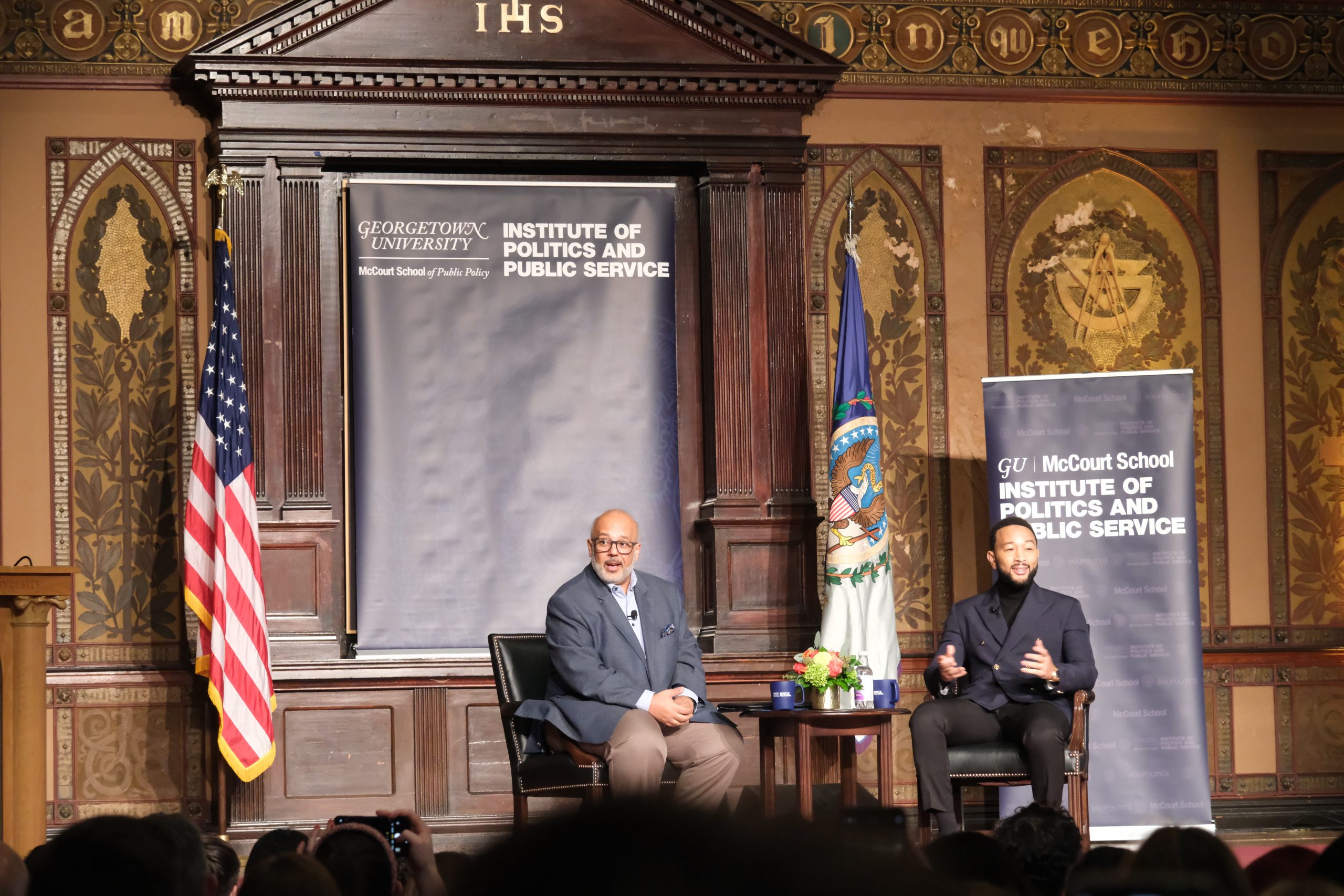The Georgetown University Institute of Politics and Public Service (GU Politics) hosted musician and activist John Legend for a discussion about the election and his own social justice efforts, on Oct. 24. The conversation was moderated by the GU Politics Executive Director, Mo Elleithee (SFS ’94).
Over the course of his career, Legend has earned 12 Grammy Awards, an Emmy, an Oscar, a Tony award, and a Golden Globe, making him one of only 21 people to earn the honor of an EGOT—or a performer who’s won an Emmy, Grammy, Oscar, and Tony. Legend is also the co-founder of Get Lifted Film Co., a film production company that aims to uplift marginalized voices.
Elleithee began by reading part of an essay that Legend wrote at 16 and won him his local “McDonald’s Black History Makers of Tomorrow” writing competition.
“I plan to impact society by developing my own character and being a leader in the community,” 16-year-old Legend wrote. “By example, I plan to use my personal skills and my musical talents to be a positive role model for my fellow Afro-Americans. I envision a successful musical career that will allow me to obtain high visibility in the community. This, in turn, will put me in a position of great influence, which I will utilize in order to be an advocate for the advancement of Blacks in America.”
Elleithee’s first question was simple.
“How’s that working out for you?”
Legend began by speaking about how he got his start as a musician. In his youth and later in college, Legend was involved in a cappella groups and church choirs. His first professional job was as a pianist for a single in “The Miseducation of Lauryn Hill,” while still a junior at the University of Pennsylvania. The album would later win five Grammys, including Album of the Year.
“One of my good friends, who was in my choir at the church I was working at, she had grown up with Lauryn Hill and wanted me to meet her. So she brought me to a studio over in the Newark area in New Jersey, and we sat, we hung out,” Legend said. “ I sat on the piano and played a couple of songs, and Lauryn asked me to play on the record they were working on.”
Even after playing on what would become one of the most iconic albums of the 21st century—and what Legend called his “claim to fame” during his senior year at Penn—he still ended up working outside of the music industry after graduation.
“I wanted to make music for a living, but also needed a day job. I didn’t have parents who could take care of me. I had loans to pay back,” Legend said. “I ended up applying to the same kinds of jobs my Penn friends were applying to. And I got hired at BCG, the Boston Consulting Group, and I worked there for three years after college.”
The conversation then shifted to Legend’s childhood, with Elleithee asking what inspired his interest in the civil rights movement and struggle for Black liberation. Legend said his passion started with his interest in history, particularly in activists like Dr. King and Rosa Parks, who fought to achieve racial equality.
“I also looked up to musicians who used their power and platform to help inspire and enable those activists,” he said. “I looked up to people like Harry Belafonte and Nina Simone, Aretha Franklin, Stevie Wonder and Marvin Gaye, who not only made music that was the soundtrack for a lot of these marches and protests, but also using their platform and their resources, their success in the industry, to turn around and help the activists.”
When Legend achieved status in the music industry, he knew he had to follow in their footsteps.
Eleithee then asked Legend about his song “Glory,” which he wrote and performed alongside artist Common for the 2014 film “Selma.” The film told the story of activists, including Dr. Martin Luther King, who marched across the Edmund Pettus Bridge in Selma to Montgomery, Alabama to advocate for Black voting rights. The song, which was featured in the movie, won Legend a Golden Globe, Grammy, and Oscar for Best Original Song.
For Legend, writing the song connected him with the past and oriented him to the present where the Black Lives Matter Movement was gaining momentum.
“Michael Brown had been killed by police officers, and people were marching through the streets with their hands up, and so we listened to our lyrics,” Legend said. “Eventually, all those protesters that encouraged us and inspired us to write this song and to include the modern-day movement for Black lives, they started marching with our song after the song came out..”
In that same year, Legend founded freeamerica, an organization that, according to their website, is “amplifying the conversation about mass incarceration and systemic injustices by building thriving communities to make lasting change.” Legend was motivated to create freeamerica after reading Michelle Alexander’s The New Jim Crow: Mass Incarceration in the Age of Colorblindness, a book about mass incarceration and the way it disproportionately harms Black and brown communities in the U.S..
“Sometimes I’ll read a book that really inspires me, sometimes angers me, makes me more passionate about something,” Legend said. “We just went around the country and talked to activists, people affected by the system. People were in prison. We visited them, we visited juvenile detention centers. We talked to everybody, all the stakeholders. And then we started to formulate some policy ideas that we wanted to fight for, with their consultation.”
Elleithee then shifted the conversation to the presidential election, which was then upcoming, and narratives surrounding the expected voting patterns of Black men.
“As someone who has spent their life advocating for the Black community, there’s a narrative out there that the first Black woman candidate for President United States is struggling relative to her predecessors and Democratic nominees, with Black men particularly, that she’s not pulling as much of that community as her predecessors have,” Elleithee said. “What’s your take on that?”
“Well, first of all, for some context, Black men are going to vote for Kamala Harris more than any other demographic group in the nation, except for Black women. So we will not be the reason she loses,” Legend said.
“At minimum, we’re going to be supporting her around 80%,” he added, which was true.
He then said pundits shouldn’t be focused on Black men’s support of Harris, but rather why so many other demographic groups will support Trump.
“And then if you look at all the other demographic groups, I’m like, shouldn’t the question we ask of them [be], ‘why?’ When his former Chief of Staff says he’s a fascist, when his former Secretary of Defense says he can’t be trusted in power because he’s a fascist and wants to be a dictator, when his former Vice President was threatened to be executed by supporters, and he won’t support him, why aren’t all of you voting for her at 80%?”
Next, students were invited up to the microphone to ask questions. The first student asked Legend about his connection to reproductive rights as the father of two daughters.
“You’ve probably heard my wife talk about our journey with fertility and losing a child and having abortion to treat a miscarriage. And so the issue of reproductive justice is very personal to us,” Legend said. “We have two daughters, and we want to work where they have the same freedoms that their mother had.”
Another student asked Legend about political polarization across the United States, and whether Legend sees the country being able to come together. Legend responded that he feels that much of the nation’s division has to do with misinformation and disinformation.
“I feel like a lot of people are often not even choosing to but kind of being led in a direction where they’re not hearing the truth anymore, and they’re in a bubble that only reinforces whatever their ideological fires are,” Legend said. “And I worry that it’s only getting worse because we have a person who bought Twitter to make a disinformation machine.”
On the topic of disinformation, Elleithee asked Legend about his hometown of Springfield, Ohio, which recently became the subject of a national firestorm after former President Trump falsely claimed in the September presidential debate that Haitian immigrants in the area are “eating the pets of people who live there.”
Legend expressed frustration at the claims, noting that they couldn’t be further from the truth and that he’s seen his community come together in the months since.
“I was just in Springfield, literally yesterday, and I sat in a Haitian restaurant,” Legend said. “I feel like so much of what I’ve seen in Springfield is very pertinent about our ability to get along with each other. We have a Republican mayor, we have a Republican governor in the state of Ohio who’s actually from our area in Ohio, and both of them have done what they could to turn the temperature down, to tell the truth and fact-check people from their own party who are spreading lies about the Haitian immigrants in our community.”
As the event drew to a close, Legend encouraged students in the audience to use their voices for good, both at Georgetown, in D.C., and in their own communities.
“I want everybody to be open, to be empathetic, and also remember that so much of the change that you want to see in the world, as we’ve learned, as my organization has learned, happens in communities all over the country and all over the world,” Legend said.
Legend also advised students to focus their reach outside of the immediate D.C. area, and to follow their passions in changing the world.
“We’re in the seat of power in the United States right now, and the temptation may be to only focus on what’s happening here in Washington, D.C., but just remember, there’s so many ways you can make a difference and to get the kinds of wins that you want, all over the country, all over the world, in communities who need you, who need your brain power, your empathy, your care, your ingenuity.”





